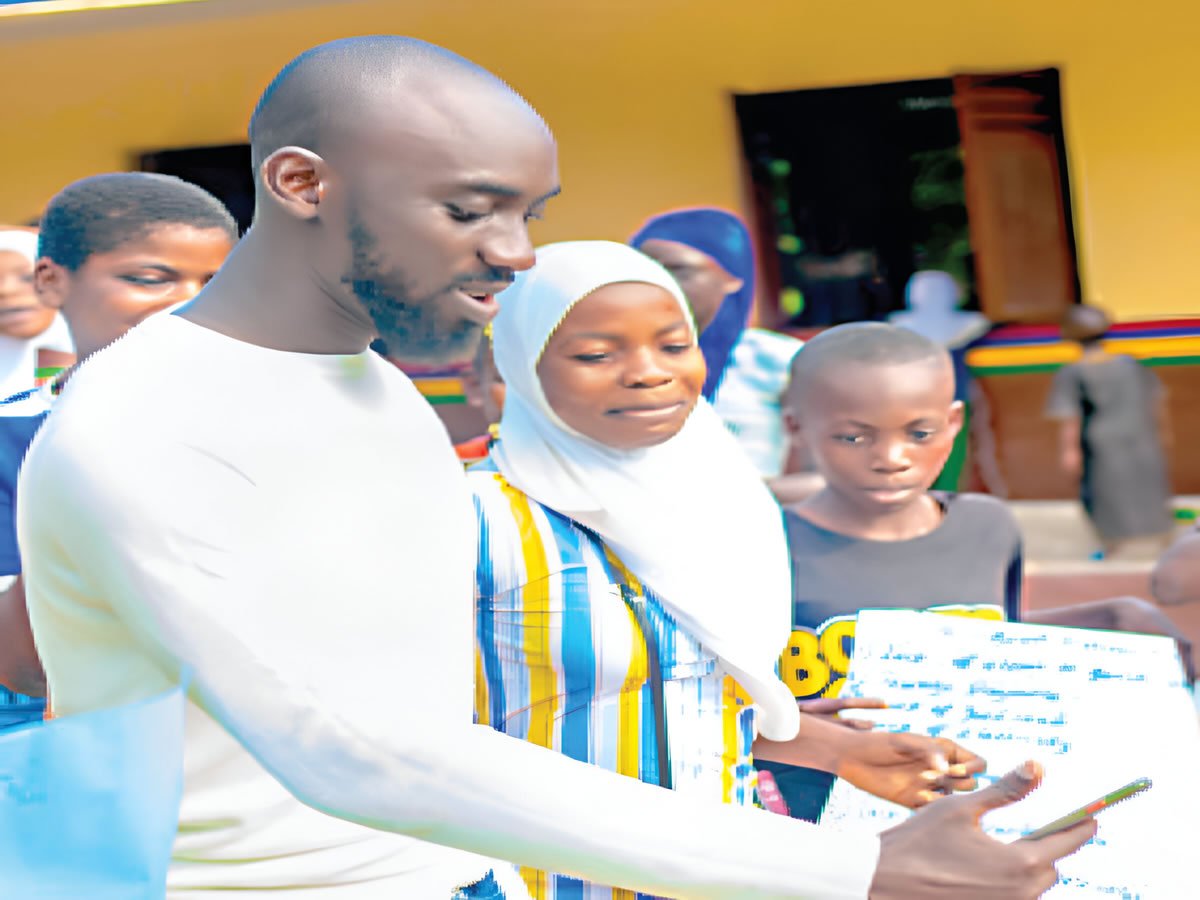With lack of access to career counseling and advisory largely contributing to unemployment in Africa, founder of the Kayode Alabi Leadership and Career Initiative (KLCI), Hammed Kayode Alabi, in this interview with IFEDAYO OGUNYEMI spoke on the broader impact on youths in Africa and how Rafiki AI, a generative AI career advisor, has been introduced to address that barrier, among other issues.
What does this AWS support mean for youth development in Africa, and how will Rafiki AI address career challenges faced by underserved youths?
The Amazon Web Service Education Equity Initiative offers organisations developing digital solutions for underserved learners globally and offers cloud credits up to $100,000 to build their solutions. Such initiatives create a leveling ground for organisations in Africa to develop and create tech-based solutions that can revolutionise learning for underserved youth on the continent and the Kayode Alabi Leadership and Career initiative has been able to take advantage of that by receiving $51,000 cloud credits to build Rafiki AI, a generative AI WhatsApp-based career counseling and advisor for underserved and displaced young people on the continent. Rafiki is also the first of its kind of solution on the continent. It comes at a time when about 100 million underserved young people are currently unemployed and we can point to that lack of mentoring and adequate career information as one of the reasons for that and with Rafiki, we are getting that reason away. As one of my colleagues Mustapha Lawal mentioned in one of his articles he wrote about Rafiki. He said, In some parts of the world, mentorship is just a question away. An older cousin. A seasoned uncle. A LinkedIn message. A university career office. A timely recommendation. A nudge in the right direction.’ But for many young people in Africa, especially in underserved and displaced communities, mentorship doesn’t knock. It hides. Often in the silence of overwhelmed classrooms, in the lack of structure, in the weight of “you’ll figure it out. Sometimes, it shows up too late. Most times, not at all. I’ve sat with teenagers who were already being told to “make it quick” with their dreams. I’ve spoken with final-year students who’d never heard the phrase “career pathway” until graduation day. This isn’t because they don’t have dreams. It’s because they never had a guide to name them. And that’s where the story of Rafiki AI begins.
His rendition shows the gap we are filling with Rafiki. We are giving underserved young people something to believe in.
Can you explain in detail how Rafiki AI leverages technology to bridge the career guidance gap for young people in Africa?
Rafiki uses generative AI technology; think about it as ChatGPT for career support, advice, and guidance and it all happens on WhatsApp. That is how it bridges the gap in career guidance for young people. It makes career guidance and advice accessible at the tips of their fingers. In a case where they cannot access career support or counselling in their school or pay up to $50 for a career coach, now they can have access to this for free and on WhatsApp, especially for young people who cannot afford it. Young people living in slums, rural communities, displaced communities and have access to the right career support and information on their Android phones with the slowest, and limited internet. In our pilot, one of the users mentioned, “This is good, and being able to use it with a terrible internet and accessible on WhatsApp is what makes it unique.” So, it is giving them something to believe in.
What makes it more effective than traditional counseling methods?
Whilst I still believe traditional counseling methods, especially being able to speak to an expert and that in-person experience may be difficult to replicate. The challenge is how many people have access to this, especially in low-income settings and communities or those families with little or no resources or young people thinking about where the next meal would come from. How do they want to access such counseling services and how would such service be delivered at scale? You see, we have tried different methods in the past. We have run 1-2-1 counseling support but at the end of the day, we could not reach the majority of the students. We have even tried a phone call or hotline but we barely received any calls. We even created a WhatsApp line for students to chat with us on but manpower was a challenge. However, with generative AI, just in a week, we have reached 1,600 young people in more than 22 African countries, 12 countries from the rest of the world, and 14,000+ messages were exchanged between Rafiki AI and the users. So, tell me if a human can do this in one week. The scalability and support they get, and the intelligence powering it. The AI source has been trained on billions of data available on career intelligence which means it is drawing wisdom from all the career resources out there and we have also been able to contextualise that training and make sure it gives adequate career support and advice. Again, while I respect traditional counseling, accessibility has always been a concern. Rafiki gives every young person that is underserved and displaced a chance to dream.
One of the users and champion of Rafiki said, it gives young people “Hope” and that is what it means to create a technology with impact and change in mind. More so, it has also been praised for its conversational intimacy and personalisation. Plus it can maintain conversation for 24 hours, available 24/7 and it can create a career pathway plan in about 1 to 2 minutes conversation and even create a CV or career portfolio in minutes. Isn’t that magical? One of my team members Olatunji Hassan said “We will be many” and that is what creating a revolution and movement means with Generative AI. The scale.
What challenges did you face in bringing Rafiki AI to life, and how did you overcome them?
One of the major challenges we faced was being domiciled in Nigeria. Sometimes there is a distrust with host service about Nigerian organisations or companies, so at every point in time we have to prove our legitimacy as an organisation and describe what our use case was. So, our developers were spending time responding to queries and at some point, I had to be involved too. I think one of the ways we overcame it was through our rigorous corporate governance, and good online reputation as our social media were quite active and we have been featured in the news both globally and nationally, and have been funded previously by the likes of the Western Union Foundation Fellowship, Schmidt Futures, and recently Amazon Web Services through the Education Equity Initiative. That credibility helped us scale through the verification of host services. However, it brings a lot of questions about young organisations trying to create a tech or AI solution on the continent. What if they do not have all of these things? It may be quite challenging for them. Anyways, we are leading the way in terms of AI for social change and we hope we can give other social enterprises and non-profits in Nigeria and Africa the courage to leverage AI to solve social change problems. We have also given them something to believe in.
How does Rafiki AI fit into your broader vision for youth empowerment in Africa?
I was chatting with a senior colleague some days ago who is about to come on board as a partner. She mentioned how low-income private schools do not have career counselors or support in Nigeria and considering we have more of those schools in the country, how do we ensure that young people have the right tools to make good career choices? Not only that, I have spoken to several young leaders across Africa after launching Rafiki AI and showed them how Rafiki works. Many of them wished they had something like that when they were younger that could help them answer many of their career questions. With the increase in unemployment and with mentoring, and career support being inaccessible, Rafiki is offering a pathway and a way out. It could communicate in all the major Nigerian languages for example (Igbo, Hausa, Yoruba, and Pidgin). It could also communicate in French which means we can reach those in Francophone African countries; we have even had users from the Benin Republic. It could communicate in Swahili, one of our consistent user bases after Nigeria is located in East African countries and we could reach refugees in those countries too. It could communicate in about 56 languages.
In fact, a refugee champion Latjor Wuon Lat Dak has this to say about Rafiki. He said, “I had the chance to interact with Rafiki AI just yesterday, exploring some career-related questions—and I must say, the experience was both seamless and insightful. The platform’s simplicity, accessibility, and relevance truly stood out. I have already introduced it to my refugee network within our institutions, and I highly recommend it to anyone seeking reliable and accessible career guidance. It is a real game-changer. Kudos to you Hammed Kayode Alabi and your incredible team behind this powerful initiative. This is more than just a tool—it’s a movement empowering individuals to own their career journeys.”
Again this is what it means to create a revolution and give people something to believe in.
KLCI has been at the forefront of education and workforce readiness. How does Rafiki AI contribute to solving the broader challenges of youth unemployment and skills development in Africa?
As I have mentioned, lack of access to adequate career information is one of the ways that contribute to unemployment and our goal is to remove that barrier. At least we have gotten one problem out of the way. Youth unemployment is more complex than we think. There are multiple factors behind it and lack of access to career information and support is one of them. In a world where CV, interview prep and career coaching has been commercialised, Rafiki is giving those without the resources and access a chance. I would say a lifeline toward preparation for meaningful and dignified jobs.
What measurable impact do you expect Rafiki AI to have on young people’s career trajectories across Africa, particularly in rural and underserved communities?
The idea and hope is that young people would be aware of their strengths, interests, and struggles, and find their purpose and life mission as they find job and employment opportunities. Whilst we can always track the numbers of those who use the platform because of data privacy, we hope they are now aware of the career opportunities available to them and that 90% of them can make correct career decisions and explore various career options. We are looking forward to having multiple pilots and case studies through the organisations and schools we work with and drawing from the lessons. Our volunteers have also been collating feedback from some of the first early users and we can draw a sample from those to measure how the platform is working and the support it is giving. We are also hoping to track comments and mentions about how the platform has been used and we hope all of those various data sources can give us a better outlook on how the platform works. At the moment, we have about 1,800 users from over 22 African countries, exchanging over 16,000 messages and that is about 16,000 queries and messages processed. Just imagine if this is done by humans, the stress and struggle. This is what scale means. This is 1,800 young people accessing career services in just about 11 days.
How does the AWS Education Equity Initiative contribute to closing the digital divide and ensuring equitable access to career development resources for African youth?
I would like to quote Jeff Barr, Chief Evangelist of AWS. He said, “We believe that Generative AI can amplify the good work that socially-minded edtech organisations, non-profits, and governments are already doing. Our goal is to empower them to build new and innovative digital learning systems that can amplify their work and allow them to reach a bigger audience. With the launch of the AWS Education Equity Initiative, we want to help pave the way for the next generation of technology pioneers as they build powerful tools, train foundation models at scale, and create AI-powered teaching assistants.”
Through cloud credits, for which we received $51,000, we have been able to build what is considered the first African Generative AI career advisor for underserved and displaced young people and also one of the fastest growing AI solutions for social good on the continent and it is possible through initiatives like the AWS Education Equity Initiative and this one example of our initiative such as this can close the digital divide and help us solve major problems such as making lack of access to career supports, counseling, guidance and service accessible through the fingertips of young people and a smartphone. More so, powering such solutions using generative AI and WhatsApp. I am proud to say that my younger sister who is in her second year at the University in Nigeria can now access career services and support through her digital device. That is the kind of world I am creating…giving people something to believe in. To believe in their own potential and capacity to thrive in a competitive world. That is what Rafiki is all about. It is more than an AI solution or tool, it is about opening a pathway to dream for a young person who can’t on the African continent. It is providing them an entry point into the world of possibilities.
How can policymakers, educational institutions, and private sector players collaborate towards driving lasting change in the area of youth development?
I will give a simple answer to this. We should not see ourselves as competitors rather than collaborators in solving wicked problems hindering youth development at scale. We need to work together to tackle these problems head-on. Young people themselves have created innovative solutions to solve some of the social problems we face on the continent. How do we support those ideas at scale and use our expertise in policymaking, legacy, and numbers educational institutions have and the technical capacity of the private sector and the resources, and funding to make sure these ideas can reach more people? We hope Rafiki can actually bridge that gap because we have been seeing educational institutions reaching out to scale this idea and we have started having meetings with policymakers too. We hope as it has given us and our team something to believe in, we hope it will do the same for them and can serve as a unifier.
READ ALSO: Unemployment: 500 youths attend 2025 Ibadan jobfest held to promote skills, innovation






